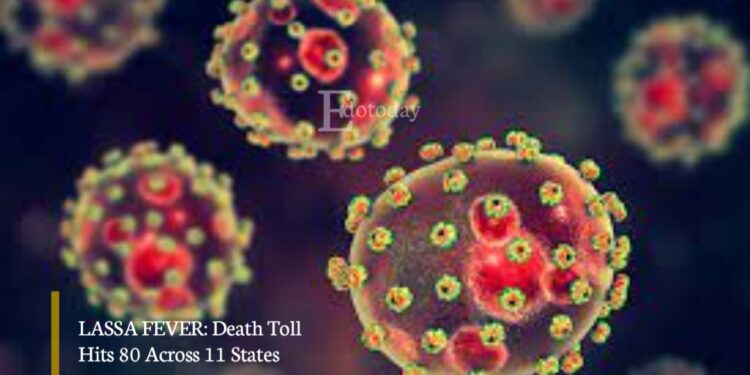According to the most recent Lassa fever situation report, Ondo, Edo, and Bauchi states accounted for 73% of confirmed cases.
During Epidemiological Week 6 (February 3–9, 2025), the Nigeria Center for Disease Control and Prevention (NCDC) announced that 413 confirmed Lassa fever cases in 11 states resulted in 80 deaths.
The case fatality rate (CFR) increased to 19.4% from 17.5% during the same period in 2024, according to data released by the NCDC on its official website. According to the most recent Lassa fever situation report, Ondo, Edo, and Bauchi states accounted for 73% of confirmed cases, with Ondo accounting for 34%, Edo for 21%, and Bauchi for 18%.
It said 63 local government areas in these 11 states had recorded confirmed cases.
“In spite of a drop in new cases from 68 in Week 5 to 54 in Week 6, the agency remains concerned about the high fatality rate.
“The affected age group is primarily 21 to 30 years, with a male-to-female ratio of 1:0.8,” NCDC said.
Although there were no new infections among healthcare workers this week, the NCDC indicated that the increased death rate was partly caused by delayed case presentations. The NCDC identified three main issues: low knowledge in high-burden communities, high treatment costs, and poor health-seeking behavior.
The National Lassa Fever Multi-Sectoral Incident Management System (IMS) was launched by the NCDC to coordinate actions in response to the outbreak.
“The key interventions include deployment of National Rapid Response Teams (NRRT) to Gombe, Nasarawa, and Benue.”
“The interventions also involve training healthcare workers in Lassa fever case management in Bauchi, Ebonyi, and Benue, enhanced surveillance, and contact tracing in affected states.”
“Additionally, there will be distribution of response commodities such as personal protective equipment (PPEs), Ribavirin, thermometers, and body bags, along with community sensitisation and risk communication campaigns in hotspot areas,” the agency said.
To enhance diagnosis, treatment, and epidemic response, the NCDC said it was also working with Médecins Sans Frontières (MSF), the World Health Organization (WHO), and the International Research Centre of Excellence (IRCE).
The organization advised Nigerians to take precautions, such as washing their hands properly, avoiding contact with rodent feces, and getting help right away if they experience symptoms like fever, sore throat, or unexplained bleeding.
“A nationwide rodent control and community awareness campaign is being planned in collaboration with Breakthrough Action Nigeria (BA-N) and other stakeholders.”
“For real-time updates and safety guidelines, the NCDC advises Nigerians to visit www.ncdc.gov.ng or call the toll-free line: 6232,” it said.
The NCDC advice Nigerians to reduce their risk of infection by following preventive measures like storing food properly in sealed containers to prevent rat contamination and washing of hands, among others.












